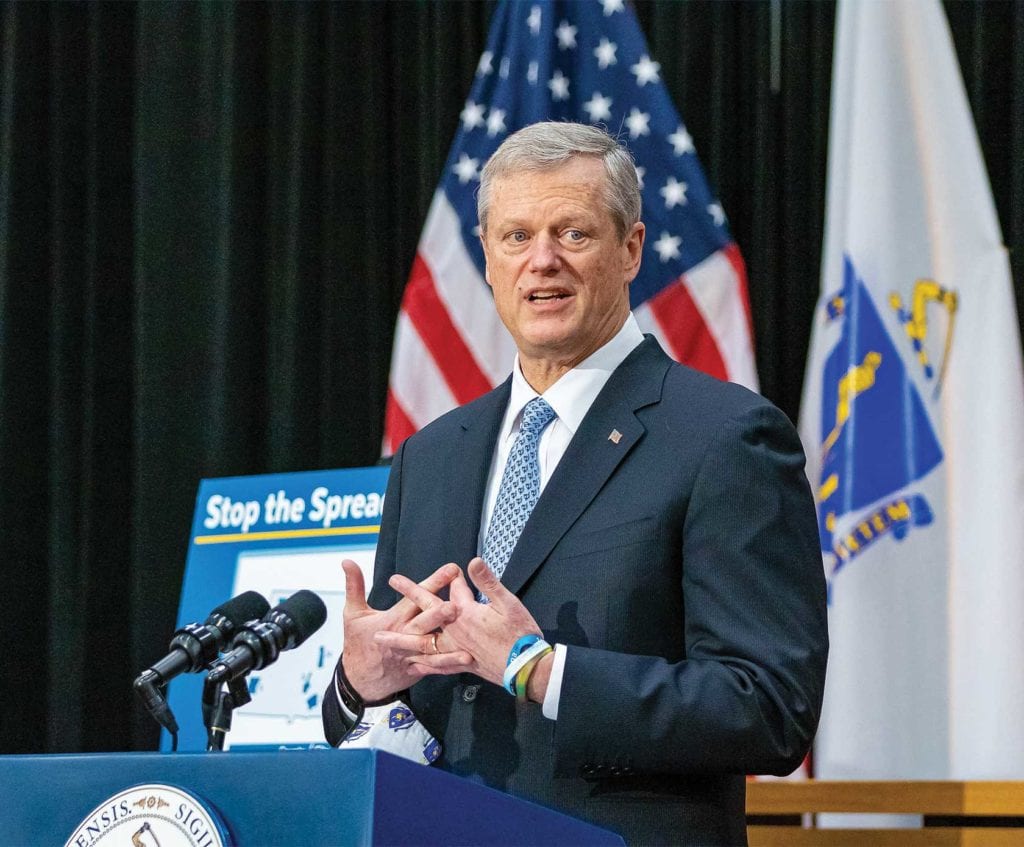Pols struggle with COVID response
No new restrictions despite infection rates surging higher than in spring

With the seven-day average of active COVID-19 cases reaching 4,490 in early December according to the city’s dashboard, Mayor Martin Walsh said his goals are to get students back to school, find ways to support restaurants through the winter and increase COVID testing.
In a WGBH interview Dec. 4, Walsh said, “I don’t feel that we need to shut down restaurants and shut down businesses,” but said he was open to considering other measures as the numbers continue to rise.
At the state level, during the previous peak in April, Massachusetts cases reached a high of more than 3,000 in a day. This month, as of Dec. 7, cases already had surpassed 5,000 on three days.
Public health advocates have repeatedly urged Gov. Charlie Baker to re-impose statewide restrictions on restaurants, gyms and other businesses as COVID rates have soared in the state. The governor has instead continued to place the blame for rising COVID rates on private gatherings and personal behavior.
School reopening plans
Baker has consistently pushed districts to remain open. In the beginning of November, the governor introduced new school reopening guidelines for the state, asking districts to prioritize in-person learning, even in 97 high-risk towns.
“At this point, there is clear and convincing scientific data that children are at less risk of getting it, and learning in the classroom — as long as you’re playing by the rules — does not lead to a higher transmission rate,” the governor said Nov. 6.
In Boston, while the Boston Teachers Union has advocated for remote learning until school buildings are safe to return to, several parent groups are protesting school closings. A group of parents at City Hall on Dec. 2 brought children, holding signs that read “BPS kids come first,” and listing establishments like restaurants and gyms that are fully open while schools are closed.
Mayor Walsh addressed the protests against closed schools at a COVID-19 press briefing Dec. 3.
“I support you, but right now, today, we are not prepared for [in-person learning],” he said, and advised against comparing the school reopening process to the protocol for keeping businesses open.
About 170 of the highest-needs students are back in school, and another 1,700 students are slated to return next week to 28 school buildings, but Walsh doesn’t anticipate schools being fully open before Christmas and is focused instead on a phased reopening after the holiday.
Outdoor dining ends
Outdoor dining on public property, such as streets and sidewalks, ended on Dec. 1, affecting a large portion of the 457 restaurants offering outdoor seating. The extra outdoor seating allowance was extended in September to keep restaurants going while warm weather persisted, along with fast-track permits for propane heaters. As the region approaches winter temperatures and storms, the city will no longer support it. Outdoor dining on private property may continue. According to Mayor Walsh, outdoor dining could reopen in the spring in a similar fashion.
Testing and vaccine updates
Testing in Boston has increased significantly throughout November, partially because of the Thanksgiving holiday. During the week ending Nov. 23, Boston averaged 4,860 tests per day. There are still two rotating free test sites, one in Roxbury and one in East Boston, that will test anyone whether they have symptoms or not.
Nationally, a vaccine is on the way from two pharmaceutical companies, and while there is evidence on the safety of each, there is concern over who will receive it first. Communities of color have been disproportionately affected by the symptoms and deaths caused by the virus, as well as health care workers who come in contact with COVID-19 patients every day.
“We will be talking about a public awareness campaign at the appropriate time,” Walsh said of the vaccine. “We’re still trying to figure out who’s going to get the vaccine first. I’m hearing it’s first responders and nurses and doctors.”
The Centers for Disease Control and Prevention recommends that the new vaccines go to health care workers and residents of long term care facilities first. Vaccines by Pfizer and Moderna are both reported to be almost 95% effective against COVID-19. This month, the FDA will decide whether to authorize emergency use of the vaccines.
General precautions
The city and the state continue to urge residents to wear their masks and stay home if they feel sick, and most importantly, get tested before and after gathering for the holidays.






